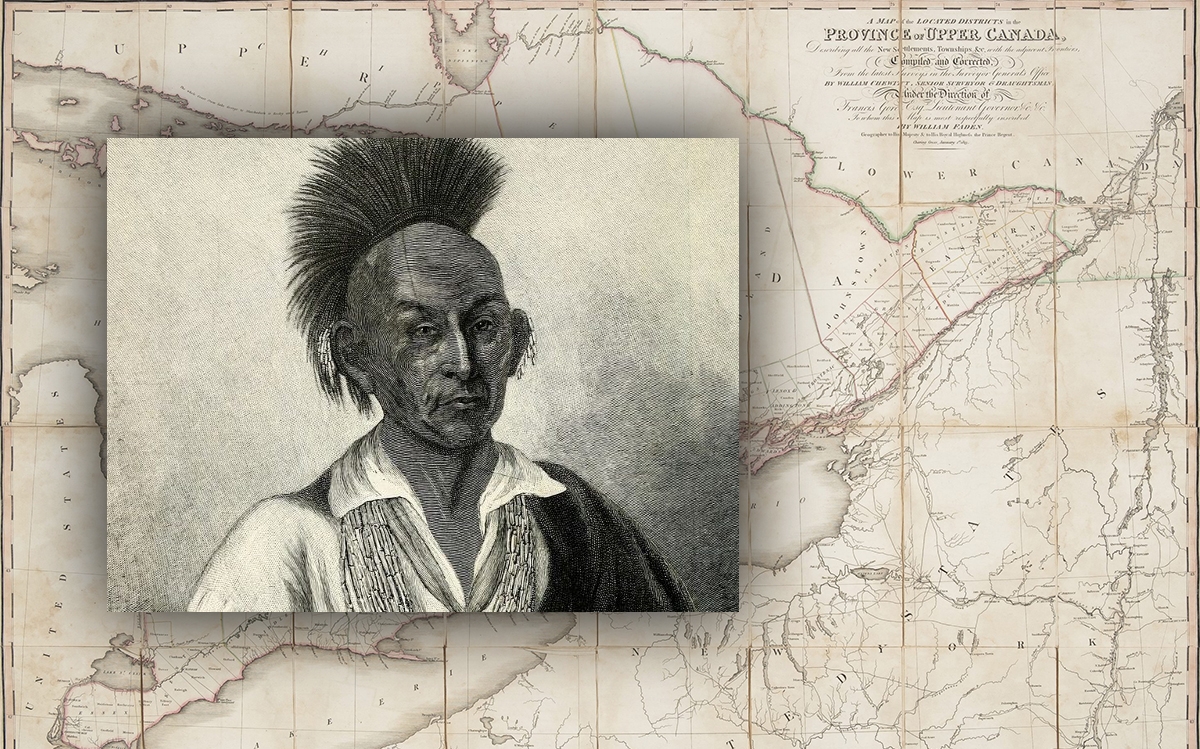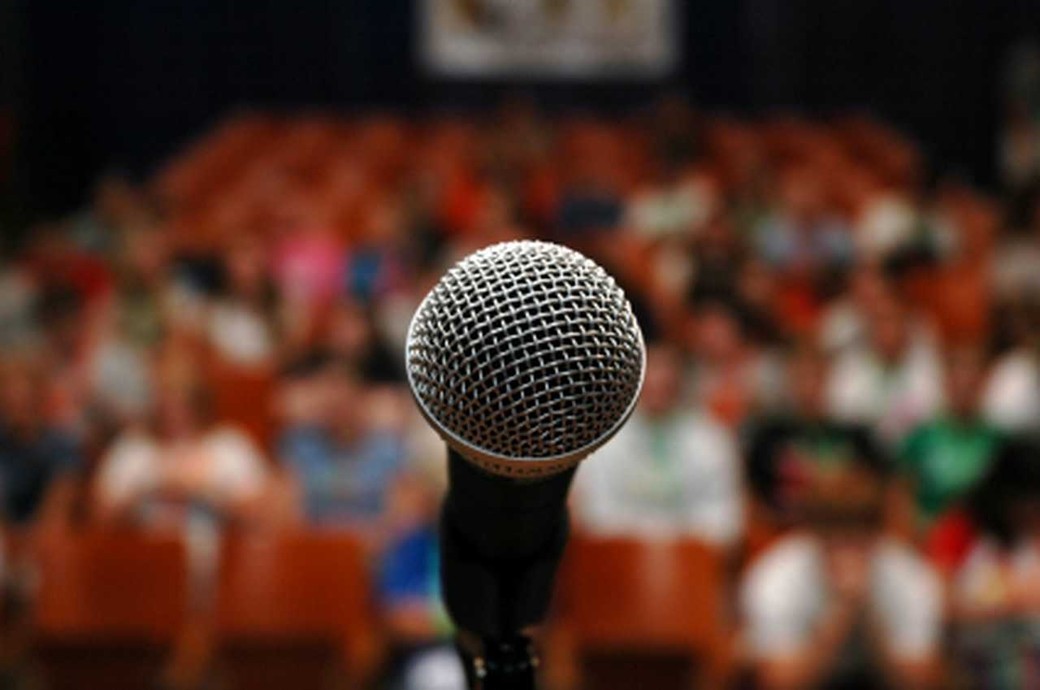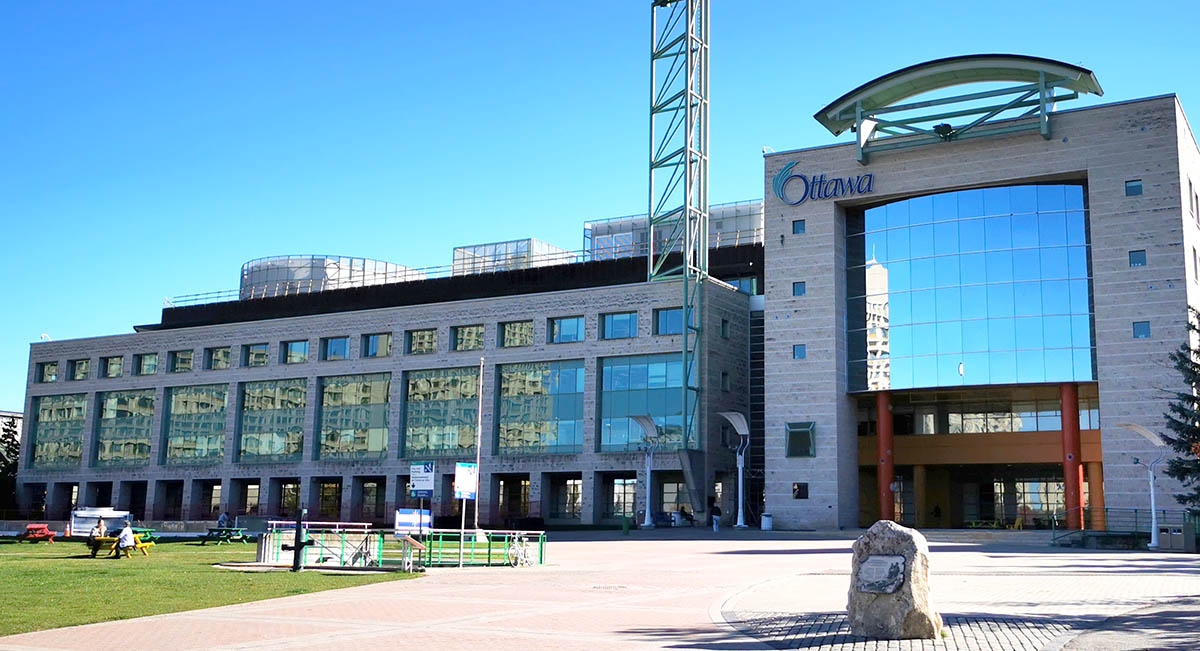
Two centuries ahead of his time: lessons from Black Hawk on the ethics of conflict
ABOVE: North American Indigenous leader Black Hawk (Ma-ka-tai-me-she-kia-kiak) over an 1813 map of Upper Canada by William Chewitt.
Canada was defended by the British Army until 1871, four years after Confederation. In the latter part of the 19th century, the symbols, traditions, structures and ethos of the Canadian Army were essentially those of the British Army of the day. Today, many of those symbols and traditions are still with us, but there has been a huge evolution of the values and ethos over time. Some of the evolution was driven by the conflicts we fought in, but a great deal of the change was just the process of aligning the values and ethos of our armed forces with the moving target of values and attitudes in Canadian society as a whole.
After some years of reading and reflection, I’ve come to the conclusion that the evolution of key elements of the ethos of the Canadian Armed Forces may well owe a substantial debt to the traditions of North America’s Aboriginal peoples.
But when one thinks about various modern legal and ethical precepts related to armed conflict, which form part of the framework within which any Canadian military officer or non-commissioned member must act, most Canadians are blissfully unaware that North America’s First Nations were a couple of centuries in the lead on these matters.
How did I come to this working hypothesis that the First Nations way of war in the early 19th century had important similarities to ours today? While preparing for a convocation address, I read the autobiography of one of the greatest North American military leaders of the late 18th and early 19th centuries, a man who was a soldier for 51 years, and who seemed almost to have a late twentieth century eye when observing the ethos of two centuries ago. His name was Ma-ka-tai-me-she-kia-kiak, which in the Sauk language means Black Sparrow Hawk, but we know him today as Black Hawk. He was the only enemy of the United States after which the U.S. has ever named a major weapons system, the Black Hawk helicopter. Interestingly, a division of the U.S. army and a professional hockey team also adopted his name.
Black Hawk was born in 1767, and lived till 1838. Before his birth the Sauk nation to which he belonged had gradually migrated over more than a century from south of Montreal to Michigan and thence gradually further south to the vicinity of present-day Rock Island, Illinois, though at the time of his birth it was named Saukenuk. This migration had been partly due to the pressures of the more powerful Haudenosaunee Confederacy, and of the gradual extension of French and British settlement. Saginaw Bay, in Lake Michigan is also named after his people. He and others believed that his great-grandfather, Thunder (or Nanamakee in the Sauk language) had been a key founder of the nation. The Sauk language is an Algonquian language and the Sauk had the closest of relations with another small nation of that language group, the Meskwaki (or Fox) nation, so as the most prominent military leader of the two allied nations, Black Hawk often led men from both nations. His military life began at 14, and from his later teens onward he was a military leader. While the armed units he led were often not large, they were frequently in the hundreds, and from time to time exceeded a thousand men under arms, which in the late 18th and early 19th century in the region of the Great Lakes or Mississippi watershed was a large force.
Black Hawk’s military views aligned fairly well with those of his peers, but what was atypical was that he set them down and had them published in 1833, the year after the Black Hawk War. His was the first autobiography of a North American Indigenous leader ever to be published. How he came to do so was interesting. Black Hawk didn’t think what he was doing in 1832 was a war, and indeed he and modern historians would agree that it was a migration. Black Hawk was unhappy that the Americans were not honouring treaties. Furthermore, in his opinion they had, in some cases, used fraudulent and illegal methods to secure treaties. Consequently he had given up on the Americans. Since he was a former ally of the British, and trusted the British, he was trying to migrate to any point north of the U.S. border in order place his band in a British jurisdiction. But the US took his actions as a war, and defeated him with a field force of more than 4000, which included in its number, curiously, Abraham Lincoln (as a lieutenant), Jefferson Davis, and Zachary Taylor. Despite his defeat, some of his actions are still viewed as among the most perfectly planned military manoeuvres of all time.
After Black Hawk’s defeat, Jefferson Davis was appointed to escort him to Fort Monroe, where he was to be imprisoned. But there was significant sympathy for Black Hawk in the U.S., so shortly after Black Hawk reached Fort Monroe, the president decided not to imprison him, but to send him on a tour of major cities of the U.S., so he could see how many Americans there really were, and might see the wisdom in ceasing to make war on them. But the trip backfired. Black Hawk was accompanied by his eldest son, Nasheaskuk (Whirling Thunder) and his government translator, Antoine LeClaire, and when he spoke in those cities he drew increasingly large and sympathetic crowds. His son was evidently thought to be so handsome that large numbers of young women also tried to attend, a sort of early type of stage groupie. When he reached New York, he drew a larger crowd that did President Andrew Jackson, who was speaking in that city on the same day. This irked the president, who decreed that Black Hawk should just be sent home.
The tour was an epiphany for Black Hawk. Having discovered that his words had at least as big an impact as his weapons, he decided to fight the next round on paper. He dictated his life story to Antoine LeClaire, who did the translation into English. Interestingly, Black Hawk dedicated his autobiography to Brigadier General Henry Atkinson, who had defeated him in 1832, and in the dedication, couched in the form of a letter, he recalls his good treatment by Atkinson, and expresses his confidence that Atkinson will vouch for those facts in Black Hawk’s narrative which are of the events of which Atkinson would have knowledge. He overtly draws Atkinson into what Black Hawk calls “the vindication of my character from misrepresentation”. This shows that even by October 1833 Black Hawk fully appreciated that he had generated considerable sympathy and perhaps support from amongst former opponents.
Black Hawk was never a political leader, and carefully describes a separation of political from military decision making, even on the battlefield, that we would certainly recognise as modern practice, but was exactly the opposite of how the British were operating in Canada. Black Hawk was an ally of Britain through much of his life; he fought in the War of 1812 around western Lake Erie with British forces commanded by Henry Procter, and he grew to dislike the way the British and Americans made war. Writing in 1833, he recalled his reaction to Procter’s blunders attacking Fort Meigs and Fort Stephenson, which caused Black Hawk to decide to lead his troops home (though he did rejoin the British forces late in the war in campaigns along the upper Mississippi River). Interestingly, his criticisms of Procter aligned closely with the findings in Procter’s court marshal, which required the reasons for his discharge to be read out to every regiment in the British Army. But it wasn’t just Procter’s mistakes, grave as they were, and which later led to the death of Britain’s most famous Indigenous ally, the Shawnee leader Tecumseh. Black Hawk didn’t think that the contemporary European way of war met any reasonable test for duty of care by officers or for ethics.
Remembering his visit to a friend’s village on his way home from the War in 1813, Black Hawk retold what he had said even then:
“ After eating, I gave an account of what I had seen and done. I explained to them the manner the British and the Americans fought. Instead of stealing upon each other, and taking every advantage to kill the enemy and save their own people, as we do, (which, with us is considered good policy in a war chief,) they march out, in open daylight, and fight, regardless of the numbers of warriors they may lose! After the battle is over, they retire to feast, and drink wine, as if nothing had happened; after which, they make a statement in writing, of what they have done – each party claiming the victory! And neither giving an account of half the number that have been killed on their own side. They all fought like braves, but would not do to lead a war party with us. Our maxim is, “to kill the enemy, and save our own men.” Those chiefs would do to paddle a canoe but not to steer it. The Americans shoot better than the British, but their soldiers are not so well clothed or provided for.”
The last sentence is really a separate observation distinct from his main criticism. Black Hawk knew that the tradition of gun ownership and use by Americans made them more practiced marksmen than the British, but that the American logistics system of 1812 was markedly inferior to that of the British.
Black Hawk had always commanded forces which included many of his relatives, and he detested the lack of concern that British and American officers showed for their men. His views on avoidance of unnecessary casualties, on close attention to the needs of troops, and on minimizing distinctions in comforts in the field between officers and men were at clear variance with British and American practice.
Black Hawk abhorred the mixing of alcohol with military operations, and also thought that the reports being made to higher headquarters were self-serving fiction. During the actions on the Detroit frontier, Black Hawk was enraged when other Indian allies of the British mistreated American prisoners of war, and he forced them to stop, which Major General Procter had not done.
Writing about his American opponents during the Black Hawk War of 1832, Black Hawk was critical of the American failure to distinguish combatants from non-combatants, the failure to honour flags of truce, and the failure to negotiate truthfully for cessation of hostilities.
Today, 182 years after Black Hawk’s death, and 207 years after the battles on the Detroit frontier, the views we now hold of everything from rules of engagement to duty of care are much closer to those of Black Hawk than to those of the European or American generals of his era.
This is not completely surprising, since modern Canadian views on many social or ethical issues stem from our present egalitarian and cooperative model of society which would have been familiar to Black Hawk, but shocking and radical to his British contemporaries.
Which raises, of course, the broader question of the origin of the differences between European societies and those of Canada or the United States. North American society is clearly less rigid and less class-ridden than in Europe. It has been popular to attribute this to geography, the process of settlement and the diversity of immigration, but it seems just as reasonable to attribute some of it to the folks who were here first.









